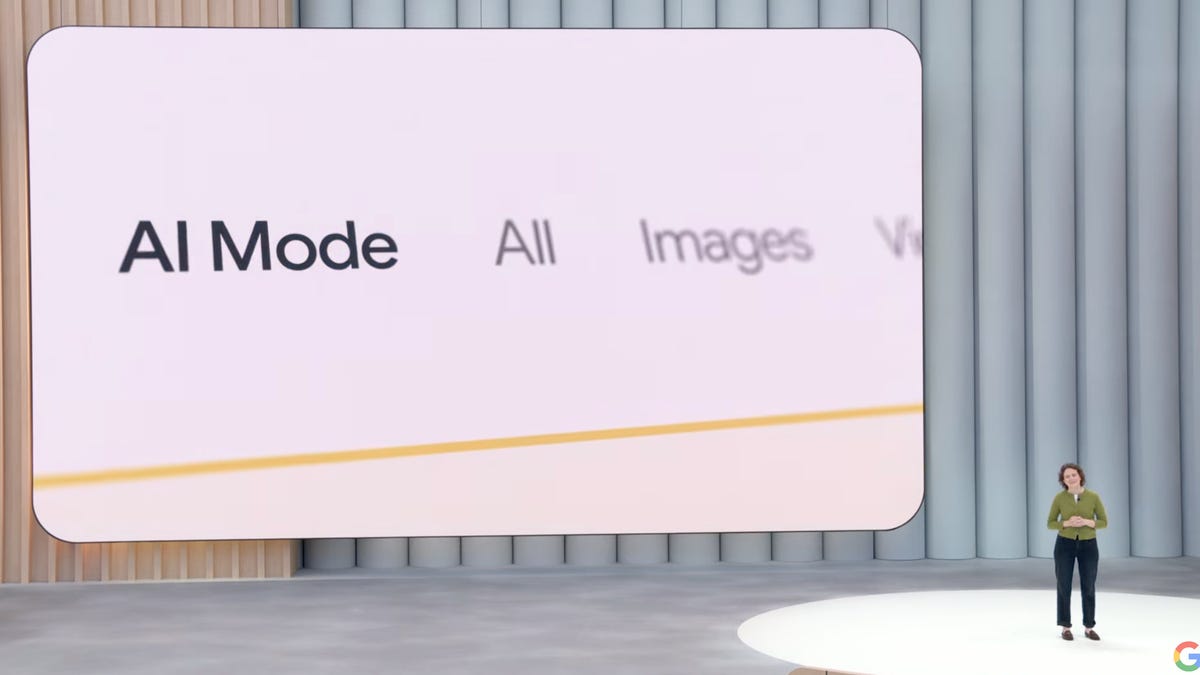A new tab is coming to your Google Search bar, and it’s going to feel a lot more like an AI chatbot than a traditional search engine.
Google started testing AI Mode earlier this year and announced at Tuesday’s I/O developers conference that the feature will roll out to everyone in the US in the coming weeks. It uses a custom version of the Gemini generative AI model to give conversational responses and pull information from a variety of sources.
Google I/O 2025 Liveblog: Gemini AI Updates, Android XR, Spotlight on AI and more
At last year’s I/O conference, Google introduced AI Overviews, which have driven a major shift in Google search and in the internet’s information environment at large. AI Mode promises an even deeper, more chatbot-like experience right in the search bar.
“AI Mode is where we will first bring our frontier capabilities into search,” CEO Sundar Pichai said.
What’s in Google’s AI Mode?
AI Mode will exist as an extra tab on your normal search bar and as new functionality within your search results.
Google said AI mode uses a “query fan-out technique” to better break down your search question, including an ability to identify and process multiple searches at a time.
Features expected to launch this summer will integrate AI Mode with your other Google apps, meaning the AI model will be able to get context around your searches from information in your email or calendar. If you ask for a restaurant in a city you’re visiting, for example, it might suggest places that are near your reservations. Google says you can always disconnect it from your personal apps.
A Deep Search function will be able to look at hundreds of different searches and use an AI reasoning model to provide an in-depth, cited response to a question in a matter of minutes, Google said.
Other AI Mode features are for shopping. You’ll be able to talk conversationally with the tool to narrow down products and even virtually try on outfits.
For sports and finance questions, AI Mode will be able to generate graphs based on complex data sets. This feature is expected this summer.
Watch this: Everything Announced at Google I/O 2025
How search is changing
The new AI Mode comes as large language models are transforming how people get information on the internet. Questions are becoming more conversational. You may no longer search “best Father’s Day gifts.” You might instead go to a chatbot and say, “I’m looking for a Father’s Day gift. My dad likes Roman history, puzzles and wood crafts.” You’ll then get a more detailed response, and a conversation, rather than just a set of links that have similar words in them.
Elizabeth Reid, vice president and head of search at Google, said users coming to Google Search are asking longer, more difficult questions, and they’re asking more questions. Integrating gen AI is one way to address that.
“This is the future of Google search, a search that goes beyond information to intelligence,” she said.
While AI Overviews first brought this kind of technology into the main search results page, AI Mode is integrating it even more.
And if you’re thinking you can avoid these AI features for a bit longer by sticking with the standard search, think again. What starts in AI Mode might be everywhere soon.
“Over time, we’ll graduate many of AI Mode’s cutting-edge features and capabilities directly into the core search experience,” Reid said.
AI Mode is expected to live at the top of the Google Search page, where Images and other modes are.
Is AI Mode the future of search?
A chat-forward AI Mode might be helpful for some search queries, but it isn’t the best fit for everything. Eugene Levin, president of the marketing and SEO tool company Semrush, is skeptical that an AI tool is right for every search.
“I think the percentage of people who willingly want to use AI Mode for everything is going to be surprisingly low,” Levin told me. “I think right now you’re going to have a lot of analysts who say this is the future, there’s nothing but AI Mode moving forward, and I think that’s not what’s going to happen.”
Instead, Levin sees AI Mode as a specific tool that can best handle a specific type of search. Complex questions that might require a lot of follow-up questions might work well in a chat-style approach. But if you’re just looking for a specific page, resource or basic facts about something like a movie, a standard search engine might offer quicker results, Levin said.
This kind of breakdown of searches — people using gen AI for one type of query and a standard search engine for another — is already evident among heavy users of ChatGPT’s search functions, Levin said. For certain types of questions, like finding financial information, even heavy ChatGPT users are more likely to turn to Google Search rather than asking the chatbots.
“Essentially, there are different types of questions,” he said. “And for each type of question, there is a best user interface, user experience.”
Read the full article here


